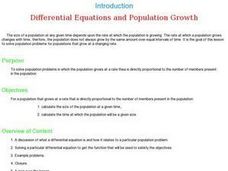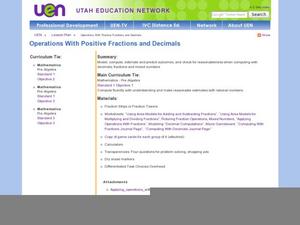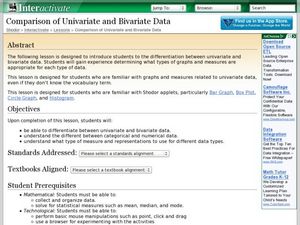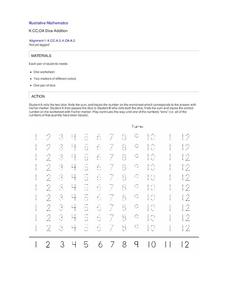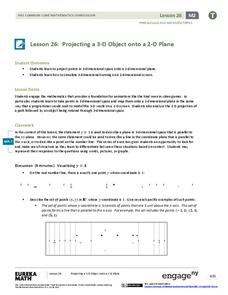Curated OER
Leap Into Exponential Functions
Students use properties of exponents to solve equations. In this algebra lesson, students add, subtract, multiply and divide exponential functions. They graph and differentiate between exponential growth and decay.
Curated OER
Exponential and Exponents Functions
Students solve problems using exponential properties. In this algebra lesson, students differentiate between exponents, exponential and log functions. They graph their functions using table and exponents.
Curated OER
In Debt or Not In Debt
Students investigate the use of credit cards. In this algebra instructional activity, students differentiate the interest rate of credit cards and how to stay debt free. They identify pros and cons of credit cards.
Curated OER
Transposition Cryptography
Students differentiate the types of cryptosystems and use them to communicate privately. In this algebra lesson, students use substitution and transposition to identify the cryptographs. They send and receive cryptograms as they try to...
Curated OER
What You See Is Not Always What You Get!
Students estimate and calculate the distance of a shape. In this algebra instructional activity, students differentiate between a horizontal distance and it's reflected image. They measure the reflection and the point starting at the eye...
Curated OER
Beginning Modeling for Linear and Quadratic Data
Students create models to represent both linear and quadratic equations. In this algebra lesson, students collect data from the real world and analyze it. They graph and differentiate between the two types.
Curated OER
Similar Triangles - Applied Problems
Students differentiate between similar and congruent triangles. In this geometry instructional activity, students identify the angles of triangles using the similarity theorem. They apply concepts of triangles to the real world.
Curated OER
Measuring Heights With Triangles
Pupils identify the different properties of triangles. In this geometry lesson, students differentiate between congruent and similar triangles. They use mathematical reasoning to solve word problems.
Curated OER
Coordinates
Students identify and label the coordinate planes by the four different quadrants. In this geometry lesson, students plot an ordered pair correctly. They identify and differentiate between rational and irrational numbers.
Curated OER
Square Roots
Learners differentiate between perfect roots and rational roots. In this algebra lesson, students perform operation using roots. They add, subtract, multiply and divide rational expressions.
Curated OER
Differential Equations and Population Growth
Students determine the size of the population at a given time. They calculate the time at which the population will be a given number. They observe how the population grows at the rate that is directly proportional to the number of...
Curated OER
Halloween Problem Solver
Looking for a way to challenge young trick-or-treaters? Fifth and sixth graders solve hard, harder, and hardest word problems about Halloween.
EduGAINs
Data Management
Using a carousel activity, class members gain an understanding of the idea of inferences by using pictures then connecting them to mathematics. Groups discuss their individual problems prior to sharing them with the entire class. The...
Portland
State
University
Historical Reflections on the Fundamental Theorem Of (Integral) Calculus
Highlight the process of mathematical discovery for your classes. This lesson examines the development of the Fundamental Theorem of Calculus over time. Understanding the history of the theorem helps create a better understanding of the...
Curated OER
Pythagoras' Theorem
Learners are introduced to the Pythagoras' Theorem and its history, proofs and practice in application. Students find perimeters, areas and volume of everyday objects. Learners state and explain the theory.
Center for Innovation in Mathematics Teaching
Vectors
Investigate vectors and learn how to use them. Explore why size and direction, as well as knowing speed and distance, are important components of the vector problems you are trying to solve. This is an extensive lesson which includes six...
Curated OER
Operations with Positive Fractions and Decimals
Explore the concept of fractions and decimals! In this fractions and decimals lesson, pupils use fraction tiles to express fractions. They play a fraction review basketball game where when a team gets a question correct they get to shoot...
Curated OER
Comparison of Univariate and Bivariate Data
Learners explore the concept of univariate and bivariate data. In this univaritate and bivariate data lesson, pupils discuss the differences between univariate and bivariate data. They work sample problems where they must construct box...
Curated OER
Dice Addition
Using the provided tracing number worksheet, a pair of kindergartners will practice their adding skills. Player A will roll two die, add the sum, and then trace the sum on the worksheet. Player B will take a turn and do the same. The...
Curated OER
Narrow Corridor
Buying a new sofa? Learn how to use the Pythagorean Theorem, as well as algebra and graphing techniques, to determine whether the sofa will fit around a corner (which I'm sure you'll agree is a very important consideration!).
EngageNY
Comparing Linear and Exponential Models Again
Making connections between a function, table, graph, and context is an essential skill in mathematics. Focused on comparing linear and exponential relationships in all these aspects, this resource equips pupils to recognize and interpret...
EngageNY
The Graph of the Natural Logarithm Function
If two is company and three's a crowd, then what's e? Scholars observe how changes in the base affect the graph of a logarithmic function. They then graph the natural logarithm function and learn that all logarithmic functions can be...
EngageNY
Projecting a 3-D Object onto a 2-D Plane
Teach how graphic designers can use mathematics to represent three-dimensional movement on a two-dimensional television surface. Pupils use matrices, vectors, and transformations to model rotational movement. Their exploration involves...
T. Smith Publishing
Big Bear, Little Bear Opposite Worksheet
Young readers engage in a counting and writing worksheet. They color the big bear's shoes orange and the little bear's blue. They write the words "big" under the big bear, and "little" under the little bear. They count how many balls the...












